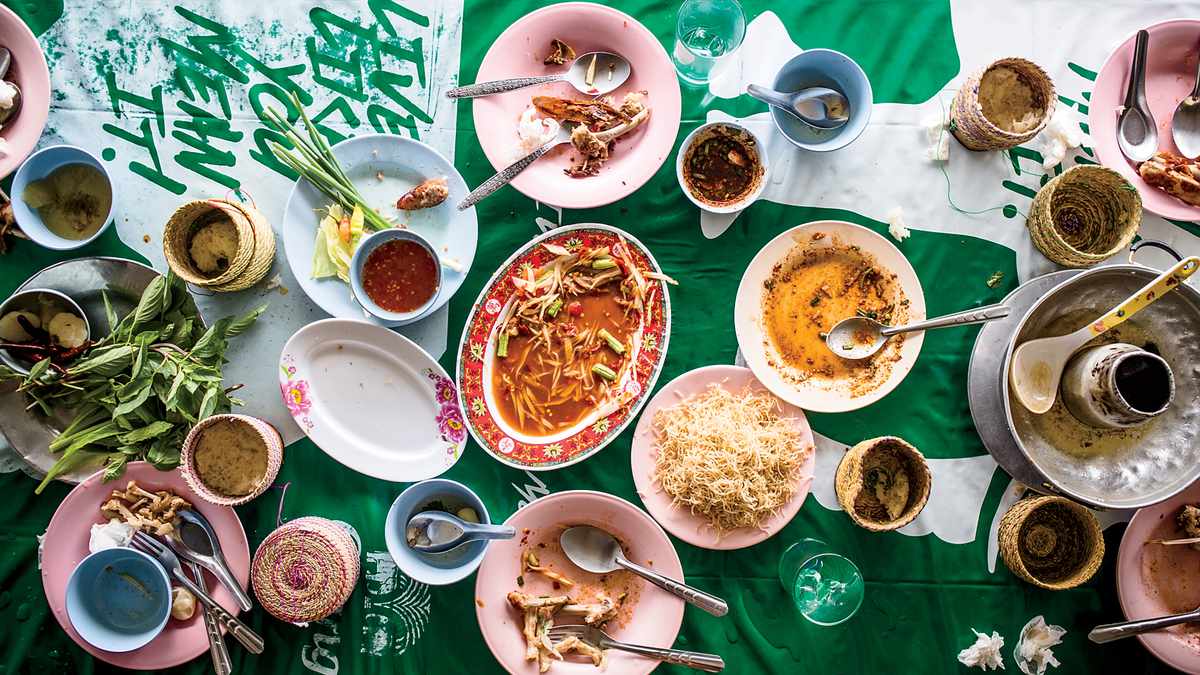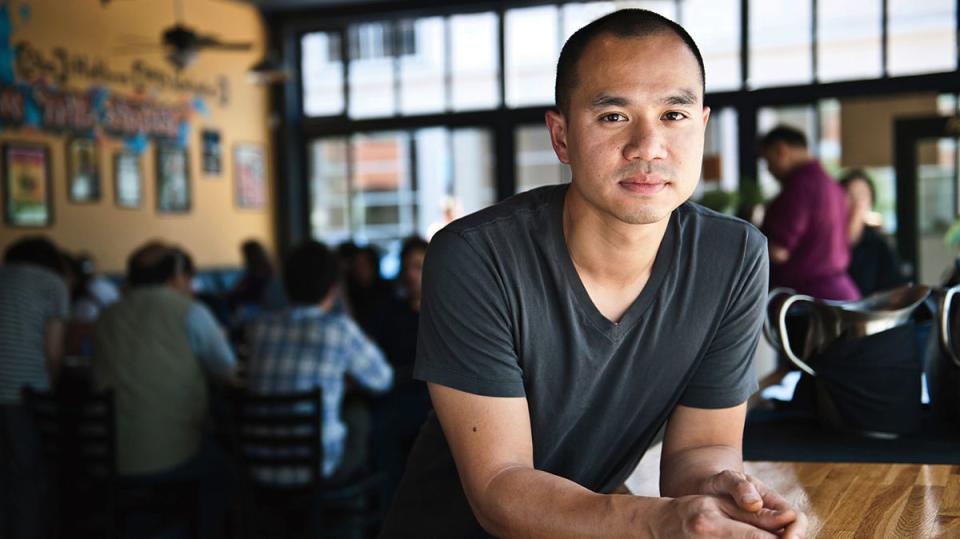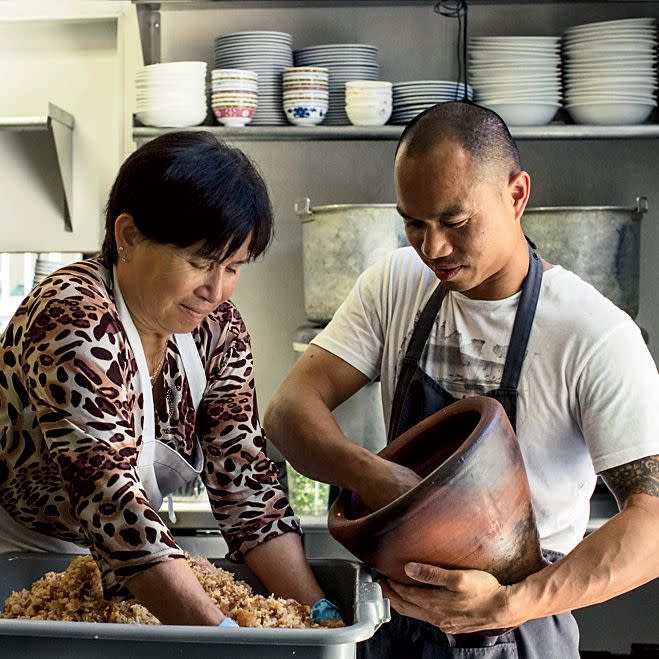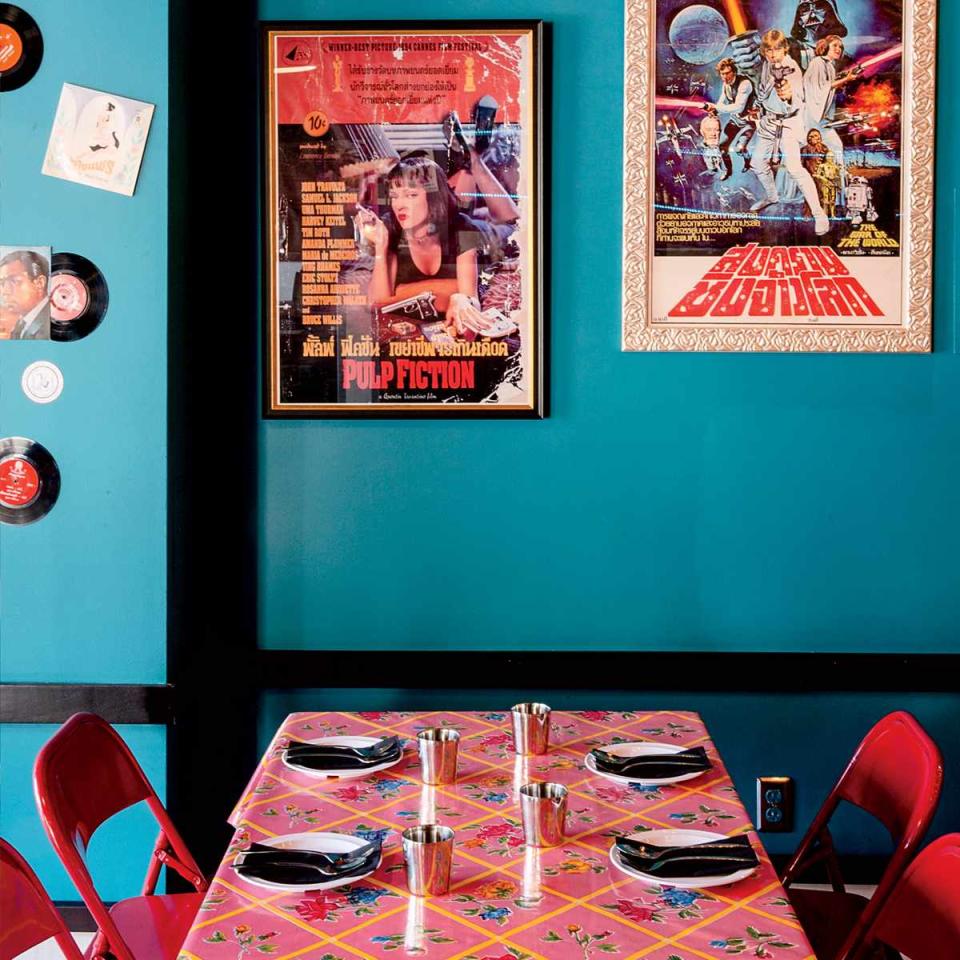A Laotian Refugee Cooks His Way Home

? Eric Wolfinger
James Syhabout's mom, Udon, is leaning so far into the tall kitchen trash can that her shoulders disappear. Just when I think she'll fall in and we will have to pull her out by the legs, she emerges with a two-foot cilantro stalk, leaves stripped, trailing a pale root. She's growling something in Lao, scolding her 36-year-old son for pulling off the leaves and tossing the rest.
"I threw away some trim," Syhabout tells me with a small smile, above the buzz of exhaust fans in the narrow prep kitchen of his four-and-a-half-year-old restaurant, Hawker Fare. "Now she's on my case." At the edge of Uptown in Oakland, California, Hawker Fare has the feel of a mom-and-pop place. It's not where you would expect to find an exquisitely trained chef like Syhabout, a guy with a gleaming Michelin-starred restaurant, Commis, and such talent for modernist locavore cooking that he's helped redefine California cuisine.

? Nader Khouri
In the past year, Syhabout and I have spent a lot of time together; last fall I shadowed him in Thailand, his first visit back in several decades, to research a book we're planning. Today, he and his mom are prepping for a big family barbecue while she bitches him out as if he were a 19-year-old stage who tournéed the potatoes wrong—and he's the happiest I've ever seen him.
The mostly Laotian dishes Syhabout and his mom are preparing are ones he grew up with, the tastes marked on his memory, indelible as tattoos: the fermented fish paste called padaek, shudderingly bitter beef bile. These are the flavors that, in the years he spent learning to become a great chef, once embarrassed him. So he boxed those memories up and hid them away.
"Now I realize," says Syhabout, "that finding my identity through fine dining came at the cost of ignoring a large part of myself. It was like a mirror I put away, thinking I'd never want to look at it again." Hawker Fare got Syhabout asking a question he hadn't considered when he cooked at Spain's El Bulli: Who am I?
Syhabout's deep reach into his past is part of a growing search for authenticity among chefs. American food is evolving as cooks look beyond the formal techniques to more personal sources of inspiration. "As Asian kids we lived so long trying to be something else beyond our culture," says Korean-American chef Roy Choi, a friend of Syhabout's since both were named F&W Best New Chefs in 2010. "The road back to the culture can be a really powerful one. I went through it. I see James going through it now."
"He's not afraid to put everything on the chopping block," says Jeremy Fox, chef at Rustic Canyon in Santa Monica and a friend of Syhabout's since they both cooked at Manresa in Los Gatos, California. "I think that's the sign of an artist. That's how you grow."
"It took time to get to the place where I don't care if my cooks see me with a $2 knife instead of my $200 one."—James Syhabout
Syhabout came to Oakland in 1981, when he was two years old and still called Somchith, his birth name. His father was Laotian, so the family was able to enter the US as refugees from Communism. They settled in a big apartment building, a place Syhabout calls the Laotian ghetto, a few blocks from where Hawker Fare is now. They lived on welfare, though his dad made a little money fixing cars in the empty lot next door with parts he scavenged.
Off the street, Syhabout grew up around non-blood aunties and uncles, in a typical Lower Mekong existence. They ate in one another's apartments or the backyard, on floor mats scarred with cigarette burns, gathering around grilled fish, jungle curries and baskets of sticky rice, everybody eating from the same platters and bowls. "Sharing the love," Syhabout says.
Udon opened a restaurant in Concord, a suburb 20 miles from Oakland. There, she made sugary-sweet pad Thai and fluorescent-colored coconut curries with swap-out proteins, the same as every other Thai restaurant in America. "I'd ask, 'Mom, why don't you cook in the restaurant like you do at home?'" Syhabout says. "She'd tell me she was afraid she wouldn't be able to bring in the customers. She said nobody knows what Laotian food is, but everybody knows pad Thai."
When he was 10 or so, Syhabout became his mom's hardworking sous-chef. After school he'd ride BART out to Concord, marinate the meats or sit on a plastic stool and pull the stems from 10-pound bags of chiles each the size of a pinkie joint. "The stools had a little cartoon character sticker on the seat," he says. "You'd sit there so long, the heat from your butt would make the sticker come off."
One day Syhabout channel surfed to an episode of Great Chefs on PBS. He saw white chefs in toques, cooking European food in pristine kitchens—no battered aluminum pans and cheap knives. He went to the California Culinary Academy straight out of Oakland Technical High, staged in Europe, opened Commis in Oakland, became an F&W Best New Chef and did not look back. Until Hawker Fare.
I used to be kind of a snob," he tells me. "In fine dining you have to be a tough guy." He's standing at a cutting board with his mom as she shows him how to use the sharp end of a bamboo skewer to shred bamboo shoots (a knife's pressure would crush them). "You use your impeccable technique as a shield so nobody can criticize you. It took me a long time to get to the place where I don't care if my cooks see me with a $2 knife instead of my $200 Japanese knife." Or to smile when his mom rides him for throwing away a cilantro stalk. There's a reason Syhabout doesn't mind getting bossed around by his mother in Hawker Fare's kitchen: It used to be hers.

? Eric Wolfinger
Before Hawker Fare, the space housed Udon's restaurant, which she opened in the late '90s, after selling the Concord place. But in 2009, after two decades of cooking, she was fried. She wanted to return to Thailand in semiretirement to raise small, furry brown Asian pigs and water buffalo. Syhabout had only that year opened Commis. The Great Recession hit hard, and Udon couldn't find anyone to take over her lease. One day, when he stopped in, Syhabout found his mom crying. He hugged her, said she could go back to Thailand—that he'd pick up her lease. "Then I thought, Shit," he says. "I don't know how to cook that food. I'd always watched my mom but never learned how to do it myself." There was something else, too, something that wasn't just about knowing how to make a jaew bong—a fiery chile dipping paste—like his mom's. It had to do with who Syhabout was in a more fundamental way.
When he launched Hawker Fare, it was with a menu of carefully conceived rice bowls: pork belly nudged along for 24 hours in an immersion circulator, green tofu curry with vadouvan. They were delicious but self-conscious, like family meal in a fine-dining place, cooked by a stage with something to prove.
Syhabout knew it wasn't right. With his mom gone to Thailand, he had to teach himself to cook, trusting his taste memories to re-create the messy, vital and unedited world he knew as a kid, relying on emotion and intuition—two things pretty much alien to fine dining. Soon he killed the rice bowls, replacing them with family-style platters that diners would mop at with clods of sticky rice: sandal-thin grilled pork chops hanging off the platter's rim, dripping juices on the table, and piles of blistered long beans with bacon. It was one of Syhabout's first big acts of letting go.
Now Hawker Fare's food is more Laotian than Thai, with a fierceness that's eclipsed the polite rice bowls. Like chef Eddie Huang, author of the memoir Fresh Off the Boat, Syhabout is engaged in a hip-hop throwdown, flinging open the back gate of the Laotian ghetto to say, "Take a look—this is the real." The experience is Syhabout's, but it's a challenge to every chef not to worry about what the world thinks.

? Aubrie Pick
At the barbecue, I follow Syhabout down a long driveway near Hawker Fare to a large paved backyard ringed by folding chairs. People arrive toting 12-packs of beer or a dish they're famous for. A four-piece Laotian band, set up on a big floral carpet in the corner, warms up with "Hotel California."
From a big Weber grill behind the buffet tables, a gray-haired volunteer pulls the first brisket from the coals. With a knife, he skives off tongue-shaped slices as Syhabout fills a paper bowl with jaew kom, a dipping sauce. A murky red flecked with black, it contains two types of cow bile, extracted from separate stomachs: One is deeply offal, the other has a low bitterness, filled out with charred tomatoes, fish sauce, fermented shrimp paste and chiles.
Syhabout is dropping handfuls of cilantro and mint into a bowl of laab goong diep. The puree is sticky, shiny and gray, a mix of raw shrimp, galangal, small eggplants charred black and the fermented fish paste padaek. It's been more than a decade since Syhabout has eaten this dish. "I wasn't allowed to have it as a kid because of parasites," he says. I ask if he'd ever put it on Hawker Fare's menu. He shakes his head. "How would we sell it? Doesn't seem very appetizing: Raw Shrimp Salad." I want to tell him he sounds like his mom in her pad Thai days but stop short: I figure the dish will eventually make it to Hawker Fare.
I ask Syhabout what effect Hawker Fare will have on Commis. He says he doesn't know yet. But he's teaching his cooks to be more open. When one brings him a dish to try, Syhabout poses a different question than he once did.
"I used to focus on the flavors, the balance, the plating," he says. "Now I ask them, 'How does it make you feel?'"
-John Birdsall is a writer and ex-cook living in Oakland, California. He is working on a book with James Syhabout.